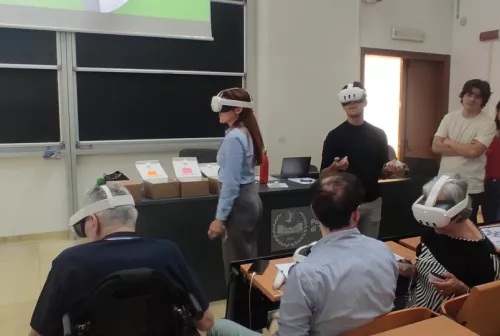The Metaverse as a Possible Response to Vulnerabilities

Starting with a case study developed within Spoke 4 NODES - the virtual reality modeling of a mountain cabin in Valle Cervo based on its photograph - an experiment was initiated at the Politecnico di Torino to explore the course topics with a new approach, capable of simulating the expected outcomes in an alternative, virtual, and immersive reality.
Participants in the new course "Virtual Reality and Vulnerabilities," led by Anna Osello, a professor in the Department of Structural, Building, and Geotechnical Engineering (DISEG), and Umberto Manera, a researcher at the University of Turin, as part of the curricular course "Great Challenges – Health," used specific headsets to tackle digital modeling concerning the chosen type of vulnerability.
The vulnerabilities of individuals - from physical illnesses to mental disorders - are at the heart of the proposed teaching. Thanks to the synergy between different disciplines - engineering and humanities - it explores the potential of digital tools in designing shared and interconnected spaces where users can interact through their avatars. Enhancing reality with virtuality is the goal of this educational experience, aiming to offer entertainment activities for those suffering from debilitating conditions through a therapeutically designed path.
From lessons to exams, the entire course took place in the Metaverse, with the teachers and collaborators also present in the virtual reality modeled by the participants.
A total of 23 multidisciplinary groups were formed, including "Digital and Sustainable Mountain," each composed of six students. Each group identified a vulnerability to address and modeled the virtual space according to the specific needs of the people involved. The ultimate goal is to train well-rounded engineers capable of designing public spaces precisely while safeguarding the various vulnerabilities present in our society.

